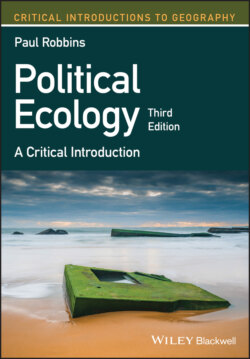Читать книгу Political Ecology - Paul Robbins - Страница 31
A political ecological alternative
ОглавлениеIn this imperialist context, where environmental influences were understood to determine the superiority and inferiority of human races through competitive natural selection, and where human influences on the environment were viewed as unworthy of examination, counter‐movements were growing. In the work of several early researchers a radical alternative to these dominant modes of explanation emerged, an incipient political ecology. Perhaps most prominent amongst these early dissenters was Kropotkin.
In contrast to the political and social conservatism associated with the geography of the period, Kropotkin's experience in the field brought him to renounce his princely title, to espouse a revolutionary socially cooperative anarchism, and to resist and dismantle the hierarchic social conditions of the time (Kropotkin 1990). In his work he sought simultaneously to tear down the socially loaded assumptions of contemporary, taken‐for‐granted, scientific knowledge, and to establish the empirical basis for an alternative model of social and natural organization. His research took a political ecological “hatchet” to the elitism and classism that pervaded natural science, while “seeding” the field with rich empirical investigations and normative visions of alternative futures.
Kropotkin's hatchet was aimed at the “scientific” socio‐biological emphasis on competition that many other scholars saw in nature. Kropotkin argued that the case for competition as the central component of evolution was a product less of empirical observations of natural phenomena than of reading a social hierarchy into the natural world (Kropotkin 1888). Kropotkin searched throughout the animal kingdom and human history and pointed to cooperation being central to survival and selection, and therefore to evolution. His rigorous field observations made way for an argument not only about the state of nature, but also about the possibilities for society, free from domination, violence, and hierarchy.
Kropotkin's approach to human–environment interaction sets a precedent for the kind of work that would follow more than a century later. The work resembles contemporary political ecology (and its progenitor, cultural ecology) in its focus on production, archival and field‐based empirical approach, concern for marginalized and disenfranchised people, interest in local environmental knowledge, and concentration on the landscape as an object of explanation.
A focus on production (farming, fishing, herding) as a key social‐environmental process means taking seriously the notion that “the means of production being the collective work of humanity” (Kropotkin 1990, p. 14), the business of making a living therefore provides the most direct window into the mechanisms of social and environmental interaction.
A rigorous archival and field‐based empirical approach allows detailed observations of plant and animal life as well as historical social case histories from around the world (Kropotkin 1888).
An explicit concern for marginalized and disenfranchised communities enables exploration of “institutions, habits, and customs” that, despite persistent exploitation by landlords and the state, locals prefer to maintain rather than adopt inadequate state‐sponsored solutions “offered to them under the title of science, but [that] are no science at all” (Kropotkin 1888, pp. 260–261).
A strong interest in the position and power of traditional environmental knowledge allows a pragmatic view of social and technological change. Though Kropotkin was a strong supporter of innovation, he insisted that the elements of progress could only be found in the existing resourcefulness of communities (Kropotkin 1985). The “hierarchical” forces of state and capital tend to crush “popular genius” (Kropotkin 1987).
Starting from the landscape facilitates a grounded approach to social and political analysis, especially the influence of people on environmental systems. Ever a geographer, Kropotkin was as interested in environmental change as he was in social reform (Woodcock and Avakumovic 1990).
Kropotkin's call for a critical science of environmental sustainability and equity was compelling and direct, and forecast a synthesis of social and environmental research.
